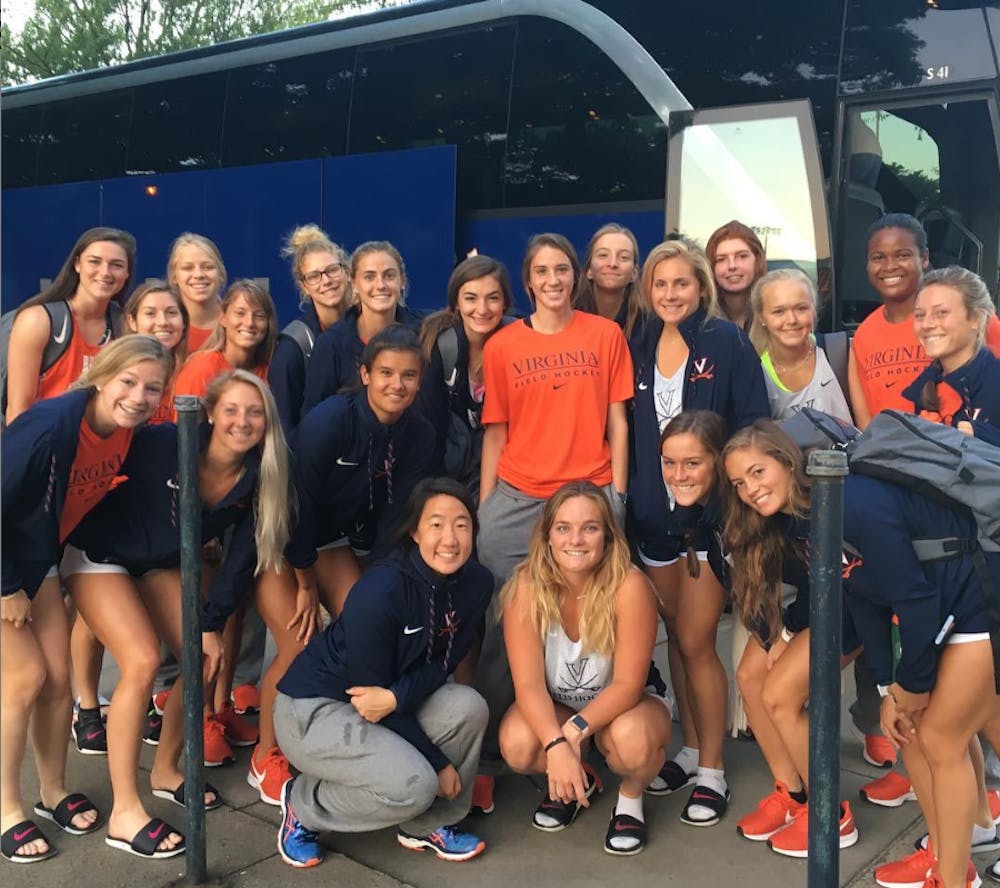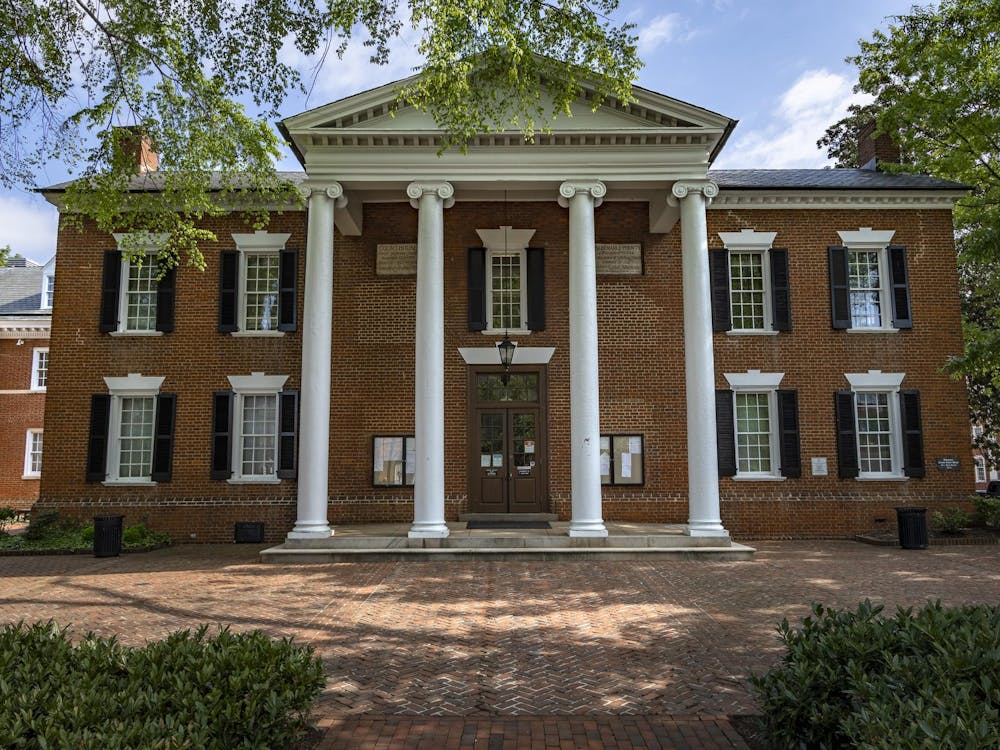It’s no secret that student-athletes at the University face a lot of challenges — early morning practices, multiple games each week and juggling all of that with a full academic course load. While the pressure to perform on and off the field is always present, the mental and physical toll that athletes face come to a head on travel days.
Travel days are unavoidable for virtually all Virginia athletes, regardless of the sport they play. Given the rigorous schedule of NCAA Division I programs, varsity athletes have to travel often to compete in road games and competitions in other cities and states. These trips can vary significantly in distance from as close as Richmond to as far as California.
While travel days themselves can be difficult, the impact they have on student-athletes’ academic lives is an even greater challenge. Players often have to put their coursework on hold for these trips. Accordingly, the preparation for travel days begins well in advance.
“If I know that I’m going to be gone [for a race or regatta] that week and not have much time, I’ll go to the library right after practice during the week and get as much work done as I can,” junior rower Emily Ashton said.
In addition to working overtime, student-athletes are responsible for making sure everyone involved — from the athletics department to classmates and professors — are on the same page. Travel days can often disrupt normal schedules, and it’s not uncommon for student-athletes to miss lectures, discussions and group meetings. Players generally carry the burden of minimizing those complications.
“I’ll email any professor or TA in the class that I’m missing and just say ‘Hey, just a reminder, I’m going to be gone. Is there anything you need from me?’ and make sure I’m in communication with them so they’re not like, ‘Oh, where’s Emily?’” Ashton said.
Even after Virginia athletes put in extra hours during the week, the actual travel day still awaits.
Road trips for athletes normally begin Thursday or Friday with the team returning to Grounds Sunday. For many athletes, the start of a travel day begins with an early-morning visit to the John Paul Jones Arena parking lot.
“For traveling, normally, the bus leaves at 7 a.m. depending on where we’re going,” Ashton said. “Usually, I get up at 6 a.m., get my stuff together and we get on the bus. If you’re not there, we don’t wait.”
The drive on the bus can take anywhere from two to seven hours, with destinations as far as Princeton, N.J. Any trip longer than a six-hour drive requires a flight out of Charlottesville-Albemarle or Dulles International Airport.
Student-athletes pass the time on the bus in very different ways. For Virginia field hockey’s sophomore goalkeeper Lauren Hausheer, the trip is a perfect time to catch up on her rest.
“[I get some] sleep,” Hausheer said. “A lot of sleep. Some people do work, a lot of people either talk or just hang out.”
However, the bus isn’t always quiet, especially when the music starts playing. For Hausheer and her teammates, favorites like “Sweet but Psycho,” “Dreams and Nightmares” and “Truth Hurts” can quickly liven up the atmosphere.
“Erin [Shanahan] has a speaker we always bring, so we’ll listen to music, sing, dance around and goof off,” Hausheer said.
Although it can be fun sometimes, sitting on a bus or plane for hours at a time can take a toll on an athlete. For Ashton and the women’s rowing team, who already compete in a highly-intensive sport, traveling can even affect how they perform in a race. Nonstop flights and bus rides with just a single rest stop can create problems for anyone, especially those that have to stay in peak physical condition.
Things don’t get easier for student-athletes once they reach their destination. From reviewing film to practicing and playing, Virginia players have to work hard to prepare for Division I competition against the country’s best. In terms of academics, student-athletes tend to spend a couple of hours on schoolwork.
“[The} worst part is that you really have no time to do work,” Hausheer said. “[There’s things to do] pretty much from the first thing in the morning to the last thing at curfew at night.”
Despite a lack of free time, there’s plenty to love about road trips for student-athletes.
For instance, traveling can be an opportunity to dine somewhere other than a dining hall or a spot on the Corner. Whether it’s a restaurant selected by coaches, a home-cooked meal from parents or food bought using per diem — a daily allowance for purchasing meals while traveling — away games and good eating seem to go hand-in-hand.
“The food [is the best part],” Hausheer said. “We go out to dinner a lot … The chicken parm is the move. We always go to Italian places, and that’s always really good.”
Besides the food, hotel stays are another highlight of traveling. Given the pressures of collegiate athletics, unwinding in a hotel room can be a blessing.
“Staying at hotels with your friends is fun,” Hausheer said. “Being able to hang out with them and just goof around. Sometimes we’ll play Mario Kart or other games … That’s when you get the most close to your teammates, when you spend time with them off the field.”
Even after the games are done, there is still one more challenge for student-athletes before the road trip ends. After a long weekend, student-athletes — who are exhausted, hungry and stressed — have to endure the journey back to Charlottesville. These trips can be even more tiring when things don’t go as planned. From bottoming out in North Carolina to getting stuck in traffic with an at-capacity bus, complications during a road trip can happen at any time.
Ironically, the worst day during a weekend of traveling might be the day Virginia athletes return to Grounds. On one hand, coming home is a relief. On the other, the road home can be uncomfortable in and of itself and being back at U.Va. doesn’t mean a student-athlete’s work is done.
“Traveling takes a lot out of you,” Hausheer said. “Bus rides and planes are really tiring. So you get home Sunday night, and you want to do work and have to do work, but you’re drained from playing in the game and traveling back home.”
Regardless of their commitments as athletes, Virginia players have the same expectations as any other student when it comes to academics. While the rest of the student body can take advantage of the entire weekend, student-athletes don’t have that luxury when traveling.
Instead, they have to find other ways to make sure they stay on track. From long nights to completing assignments in advance and relying on each other for help, student-athletes have learned to adapt to a necessary part of their lives as athletes.
Despite the challenges of traveling, it seems like there’s one positive for all student-athletes — the opportunity to build relationships with teammates, coaches and athletic staff. Road trips provide an opportunity for Ashton, Hausheer and other Virginia athletes to bond with the people they work with on a daily basis. Being surrounded by friends and family can make even the most strenuous travels bearable or, better yet, enjoyable.







